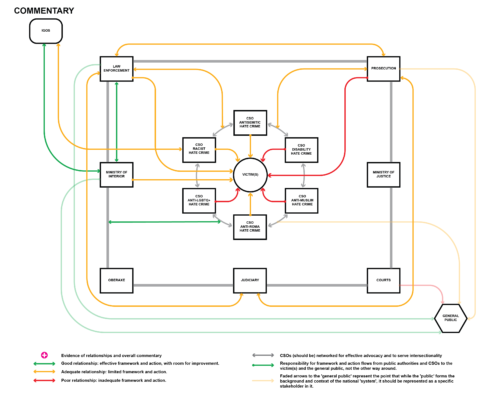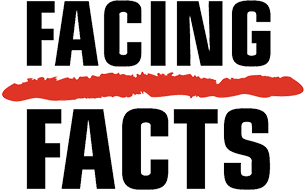Facing Facts’ research and policy work
This blog reflects on the Network’s policy and research-focused work for this year and some of our learning so far.
Facing Facts has had a strong research focus for some time. Our research findings and capacity-building programmes have been referenced in recently published reports including FRA’s report on encouraging hate crime reporting, the High Level Group Key Guiding Principles on encouraging reporting, and the Key Guiding Principles on CSO-Public Authority Cooperation.
We are now building and expanding our learning through four key research and policy activities.
Mapping Austria’s hate crime response system, with a focus on the role of civil society
The Facing all the Facts project pioneered a highly interactive multi-stakeholder method for mapping and assessing national hate crime response systems. The idea is to support national stakeholders to understand that effective responses rely on good data, which itself relies on comprehensive legislative and technical frameworks that are given life through strong inter-institutional and cross-community relationships. We are now working with Network members Zara and the Austrian Ministry of Interior to complete the systems map process for Austria by the end of the year.
There are two new aspects to this work. First we are reimagining the workshop format that creates our complex maps, to make it more accessible and collaborative. We have found an online ‘diagramming’ programme to share with our national partners that will allow us to create our systems maps in real time during the workshop without relying on Adobe Illustrator! We hope to further develop the tool’s collaborative functionality so that we can co-create our systems maps entirely online as part of our ongoing online learning and capacity building programmes.
Second, our conversations with ZARA have reminded us that there is a need to spend time supporting civil society organisations to understand the ‘hate crime response system’ as a whole and to identify their specific perspective, role and relationships within it. Austria, like many contexts, is at a relatively early stage in setting up its national reporting and recording system for hate crime. Our systems methodology allows participants to zoom into the parts of the system where civil society is most active and zoom out to place their work and relationships in the bigger picture.

(‘systems map’ for Spain. For our interactive versions, go here)
We are also appreciating the advantages of our multidisciplinary network! Since both ZARA and the Ministry of Interior are members, we can better coordinate, co-prioritise actions and ensure that the conclusions of our work complements other developments and projects.
Making anti-Muslim Racism visible
We are working with the CLAIM alliance (our newest member!) in Germany to develop guidelines and training on monitoring and recording anti-Muslim Racism. The learning for us has been how to move beyond hate crime and to develop monitoring definitions and techniques that capture the full spectrum of anti-Muslim racism. ECRI’s General Policy Recommendation 5 (revised) describes three dimensions of this form of racism: stigmatisation (including hate speech), discrimination, and hate-motivated violence (hate crime), with an intersectional dimension. We have used this framework in our workshops and drafting to develop data points, case studies and training for implementation.
Online module on police discrimination in the context of hate crime
We have brought together a fantastic working group to support the development of a new online learning module on police discrimination and hate crime. Our aim is to support learners to understand the context of structural, institutional and historical discrimination that shapes people’s experiences of hate crime and that undermines their access to the very institutions that are there to protect them. There are the obvious and well-known forms of discrimination such as racial profiling as well as lesser-known forms of discrimination such as dismissing the credibility of people with disabilities who report crimes. Our online course will also explore the impact of police discrimination and the existing international legal and policy framework.
Issues paper on online learning on for multi-stakeholder, practice-focused learners
Despite the explosion of online learning since the pandemic, we still find a lack of research that really focuses on the needs and experiences of learners in the area of human rights education, and anti-hate crime and hate speech work in particular. This is especially the case for multi-stakeholder courses, involving learners from a law enforcement, CSO, government ministry and criminal justice practitioner perspective. Since this is the precise profile of our Network members, this paper will explore the evidence that is out there to help us better understand the needs and motivations of our learners in the online space, and identify the future directions for research in this area.
Hate speech mapping
We are working on a mapping report on gaps and opportunities in hate speech research, policy and practice from the perspective of Network members. Learning from this project will help us identify Network activities for the upcoming year in the field of hate speech.
Our desk research and expert interviews are helping us to understand the importance of national political and social contexts when dealing with hate speech in this complex ecosystem. We also see that collaboration between social media platforms and CSOs has been institutionalised to some extent by the 2016 Code of Conduct on Countering illegal hate speech but that the ‘trusted flagger’ scheme should be deepened to increase the reliability of the automated detection system and other responses. The need for more collaborative partnerships with national governments has been repeatedly raised in interviews. Further specialist CSOs bring enourmous knowledge about how to ‘decode’ various forms of hate speech targeted at particular groups. However, accessing, analysing and acting on the enormous volume of data from social media platforms is a huge challenge. There is also a developing theme on the importance of addressing the causes of hate speech with a specific focus on educational paths for children and adults.
What’s on the horizon?
On 29-30 September we took part in the second meeting of the committee of experts on hate crime, which is tasked with drafting a comprehensive draft Recommendation on combatting hate crime. This latest international standard will have important committments, including on recording, data collection and victim support. As we have written elsewhere, it is key that new standards build on and further develop the current framework to provide consistency and support to those working to understand and address hate crime at the national and local level. We see alignment with current international standards, ensuring a victim-focused approach and securing the equal participation of civil society organisations within a multi-stakeholder framework as key issues as the Recommendation develops. The process is likely to last throughout 2023, and we will work with members to develop our feedback.


 Facing Facts is co-funded by the Citizens, Equality, Rights and Values Programme
Facing Facts is co-funded by the Citizens, Equality, Rights and Values Programme
Leave a Reply